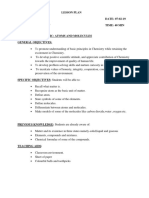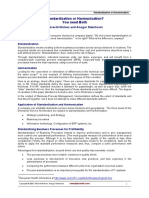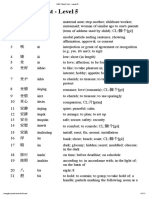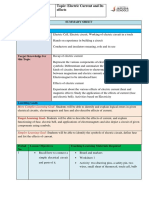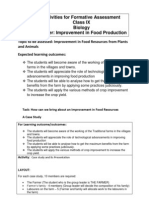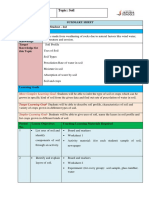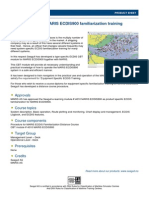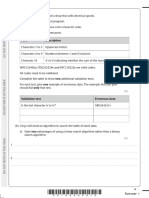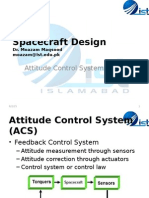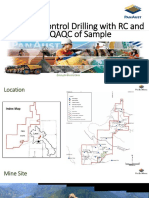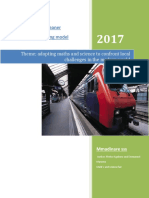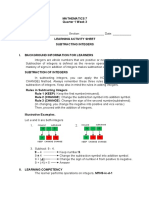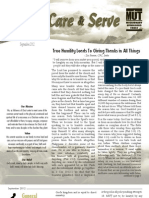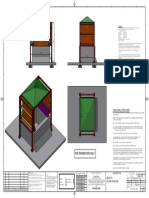Lesson Plan Class VIII - Coal and Petroleum
Lesson Plan Class VIII - Coal and Petroleum
Uploaded by
Pushpa KumariCopyright:
Available Formats
Lesson Plan Class VIII - Coal and Petroleum
Lesson Plan Class VIII - Coal and Petroleum
Uploaded by
Pushpa KumariCopyright
Available Formats
Share this document
Did you find this document useful?
Is this content inappropriate?
Copyright:
Available Formats
Lesson Plan Class VIII - Coal and Petroleum
Lesson Plan Class VIII - Coal and Petroleum
Uploaded by
Pushpa KumariCopyright:
Available Formats
LESSON PLAN
CLASS: VIII B DATE: 09-10-19
SUBJECT: CHEMISTRY TIME: 40 MIN
TOPIC: COAL AND PETROLEUM
SUB-TOPIC: COAL
GENERAL OBJECTIVES:
To promote understanding of basic principles in Chemistry while retaining the
excitement in Chemistry.
To develop positive scientific attitude, and appreciate contribution of Chemistry
towards the improvement of quality of human life.
To develop problem solving skills and nurture curiosity in students.
To inculcate values of honesty, integrity, cooperation, concern for life and
preservation of the environment.
SPECIFIC OBJECTIVES: Students will be able to:
State the meaning of natural resources.
Differentiate inexhaustible and exhaustible natural resources.
Define fossil fuel.
Cite examples of fossil fuel.
Describe how coal is formed.
Illustrate the products of coal.
PREVIOUS KNOWLEDGE: Students already know about natural resources and some
examples of it.
TEACHING AIDS:
AV module
INTRODUCTION:
TEACHER’S ACTIVITY STUDENT’S ACTIVITY
Teacher: Here are a set of examples. You have Students listen to the instructions attentively.
to divide them into two groups based on some Students classify them as:
similarities. (Teacher writes the words on the A B
board). Water Air Soil Sun Furniture Mobile
Furniture Mobile Water Air Soil Sun light light Wildlife House Clothes
House Clothes Wildlife Books Books
Teacher: What made you to divide these Students recall that group A is natural and B is
materials into A and B?
Teacher: What shall we call group A as? man-made.
Why do we call group A as natural materials? Students recall natural materials.
Teacher:Very good. What shall we call group Students recall that they are obtained from
B nature.
Why do you call them as man-made materials?
Students recall manmade materials.
Students reason out that they are not obtained
Teacher: Good. So, from this how can we from nature and are made by human beings.
define natural resources? Students state that the resources which are
Define natural resources. Good. So, from this obtained from nature are called as natural
how can we define natural resources? resources.
Good. Give examples of natural resources.
Teacher:Can we use all our natural resources Students recall air, water, soil, wild life, forest,
forever? etc…
What are the basic needs of man? Students don’t respond.
So, in order to fulfill our basic needs, man is Students list out food, shelter and clothing.
going on using the natural resources without
conserving it. So, we can’t use all our natural
resources forever.
Teacher gives another set of examples and asks
students to divide them into two and give
appropriate topics to them. (Teacher writes the
words on the black board.) Students classify them as:
Sunlight Trees Air Electricity Coal Water A B
Petroleum Soil Sunlight Air Water Trees Electricity
Soil Coal Petroleum
Teacher: Based on which attribute did you
divide them into two? Students reason out that group A can be
renewed again and again but group B can’t.
So what name can we give to them?
Students state the names as renewable natural
resource for group A and non renewable
Good. We can also call them as inexhaustible natural resources for group B.
and exhaustible natural resource. How can we Students state that inexhaustible natural
define inexhaustible natural resource? resources are those which can be renewed
again and again.
Exactly . (teacher redefines it) The resources
which are present in unlimited quantity in Students cite examples as sunlight, air, water
nature and are not likely to be exhausted by etc…
human activities are called as inexhaustible
natural resources. Can you give some examples
of inexhaustible natural resources?
Teacher:Ok good. So, how can you define
exhaustible natural resource? Students state that exhaustible natural
resources are those which are present in nature
in limited quantity and can be exhausted by
human activities.
Students cite examples as forest, coal,
petroleum, wildlife etc…
Very good. Can you give some examples of
exhaustible natural resources?
So, in today’s class we’ll learn about the
exhaustible natural resource COAL.
PRESENTATION:
TEACHER’S ACTIVITY STUDENT’S ACTIVITY
Teacher:Can you tell me how coal is formed? Students recall that they are formed from the
dead remains of plants.
Correct. Not only plants, they are formed from Students recall fossil.
the dead remains of living organisms. What do
we call for the dead remains of living
organisms? So, coal is also known as fossil
fuel.
Why coal is called a fossil fuel? Students recall that coal is formed from the
dead remains of living organisms.
What is the colour of coal and how does it look Student: Coal is black in colour and it as hard
like? as stone.
Can you suggest some places where coal is Students state that coal used in thermal power
used? plants to produce electricity and also as a fuel
in various industries. Students identify that
they were used in railway engines once upon a
time.
So, coal is having so many usefulness. But Students recall that coal is formed from the
where do we get coal from and how it is dead remains of living organisms.
formed?
Teacher explains the process of coal formation Student: Coke, coal tar and coal gas are the
with the help of an AV module. Coal is then products obtained when coal is processed.
processed in industry to get some useful
products. Can you name some products?
Good. So far we have discussed about natural
resources, its classification and coal as an
exhaustible natural resource in detail.
RECAPITULATION:
Define natural resource.
How are natural resources classified ?
What is fossil fuel? Name some fossil fuel.
What is coal?
Where is coal used?
How coal is formed?
What are the products of coal?
HOME ASSIGNMENTS:
Identify the important coal mines in India.
Write a note on the adverse effect of coal mining and oil drilling.
VALUES: Scientific temper, sharing information.
SKILLS DEVELOPED: Thinking skills, observation skills
BLACK-BOARD WORK:
DATE:09-10-2019 THOUGHT: STRIVE TO BE SINCERE
CLASS:VIIIB TOPIC: COAL AND PETROLEUM
SUBJECT:CHEMISTRY Sub-Topic: COAL
Natural and man-made resources:
A B
Water Air Soil Sun Furniture Mobile
light Wildlife House Clothes
Books
Inexhaustible resources and Exhaustible resources:
A B
Sunlight Air Water Trees Electricity
Soil Coal Petroleum
You might also like
- Physical and Chemical Changes Class 7Document4 pagesPhysical and Chemical Changes Class 7Pushpa Kumari100% (20)
- Medical Surgical Nursing (Cantuba)Document37 pagesMedical Surgical Nursing (Cantuba)incognito100% (12)
- Lesson Plan of Respiratory SystemDocument4 pagesLesson Plan of Respiratory SystemPushpa Kumari82% (11)
- Lesson Plan Metals and Non-Metals Class 8Document6 pagesLesson Plan Metals and Non-Metals Class 8sunita mishra100% (4)
- Lesson Plan Class 7Document4 pagesLesson Plan Class 7Obul Reddy Polimera100% (2)
- Lesson Plan of Waste Water StoryDocument4 pagesLesson Plan of Waste Water StoryPushpa Kumari100% (7)
- Lesson Plan of Nutrition in PlantsDocument4 pagesLesson Plan of Nutrition in PlantsPushpa Kumari100% (11)
- Pollution of Air & Water Class 8Document3 pagesPollution of Air & Water Class 8Pushpa Kumari90% (10)
- Matter in Our Surroundings Class 9Document3 pagesMatter in Our Surroundings Class 9Pushpa Kumari90% (20)
- Pollution of Air & Water Class 8Document3 pagesPollution of Air & Water Class 8Pushpa Kumari90% (10)
- Matter in Our Surroundings Class 9Document3 pagesMatter in Our Surroundings Class 9Pushpa Kumari90% (20)
- Lesson Plan of Nutrition in PlantsDocument4 pagesLesson Plan of Nutrition in PlantsPushpa Kumari100% (11)
- Lesson Plan of Waste Water StoryDocument4 pagesLesson Plan of Waste Water StoryPushpa Kumari100% (7)
- Class 8 Crop Production CH 1 (Lesson Plan)Document5 pagesClass 8 Crop Production CH 1 (Lesson Plan)sunita mishra100% (10)
- Life Processes Lesson PlanDocument10 pagesLife Processes Lesson PlanSUMAN RAWAT50% (2)
- Lesson Plan Viii Chapter 7Document3 pagesLesson Plan Viii Chapter 7Amaterasu Susanoo Tsukuyomi100% (1)
- Class:7 Subject: Science Topic: Winds Storms and Cyclones: Summary Sheet Pedagogical Approach: Student - LedDocument15 pagesClass:7 Subject: Science Topic: Winds Storms and Cyclones: Summary Sheet Pedagogical Approach: Student - LedManpreet Kaur100% (4)
- Lesson Plan Class VIIDocument4 pagesLesson Plan Class VIIPushpa Kumari50% (2)
- Combustion and Flame Class 8Document4 pagesCombustion and Flame Class 8Pushpa Kumari89% (9)
- Force and PressureDocument13 pagesForce and PressurePratibha100% (1)
- A Scheme of Learning Objectives and Verified OutcomesDocument7 pagesA Scheme of Learning Objectives and Verified OutcomesSavneet60% (5)
- 5 E Approach Based Lesson Plan - Chapter - 1 - Food - Where Does It Come From? - NCERT - CBSE - CLASS 6th - ScienceDocument27 pages5 E Approach Based Lesson Plan - Chapter - 1 - Food - Where Does It Come From? - NCERT - CBSE - CLASS 6th - ScienceLesson Planner DP100% (5)
- Class Ix L.1 Matter Around Us - Lesson PlanDocument13 pagesClass Ix L.1 Matter Around Us - Lesson PlanShailaja Mestry89% (9)
- Grade 8 Lesson 2 Microorganisms Lesson PlanDocument9 pagesGrade 8 Lesson 2 Microorganisms Lesson PlanShailaja Mestry67% (3)
- Lesson Plan Class VII (Acids, Bases and Salts)Document3 pagesLesson Plan Class VII (Acids, Bases and Salts)Pushpa Kumari100% (7)
- Class IX Science Why Do We Fall Ill - Lesson Plan PDocument16 pagesClass IX Science Why Do We Fall Ill - Lesson Plan PShailaja Mestry0% (2)
- Class:7 Subject: Science Topic: Weather, Climate and Adaptation of Animals To ClimateDocument11 pagesClass:7 Subject: Science Topic: Weather, Climate and Adaptation of Animals To ClimateManpreet KaurNo ratings yet
- Class - X Lesson Plan Chapter-2: Acids, Bases and SaltsDocument19 pagesClass - X Lesson Plan Chapter-2: Acids, Bases and SaltsBhawana Singh100% (3)
- Lesson Plan - Transport in Living OrganismDocument2 pagesLesson Plan - Transport in Living OrganismKim Gabayno78% (9)
- Basic Lesson Plan Class 8 Microorganism Friend and FoeDocument53 pagesBasic Lesson Plan Class 8 Microorganism Friend and FoeRasika PK Gore88% (24)
- Lesson Plan Class VIIDocument4 pagesLesson Plan Class VIIPushpa Kumari50% (2)
- Lesson Plan of Fibre To FabricDocument3 pagesLesson Plan of Fibre To FabricPushpa Kumari100% (10)
- Lesson Plan Class VII (Acids, Bases and Salts)Document3 pagesLesson Plan Class VII (Acids, Bases and Salts)Pushpa Kumari100% (7)
- Combustion and Flame Class 8Document4 pagesCombustion and Flame Class 8Pushpa Kumari89% (9)
- Lesson Plan of Fibre To FabricDocument3 pagesLesson Plan of Fibre To FabricPushpa Kumari100% (10)
- 11 05 ART StandardizationorHarmonizationv RickenSteinhorstDocument5 pages11 05 ART StandardizationorHarmonizationv RickenSteinhorstinvictus-incNo ratings yet
- HSK 5Document111 pagesHSK 5LeonLeonFu100% (2)
- Automatic Side Stand SystemDocument25 pagesAutomatic Side Stand SystemAravindh Kumar50% (4)
- Lesson Plan Class VIII - Coal and PetroleumDocument4 pagesLesson Plan Class VIII - Coal and PetroleumPushpa Kumari100% (10)
- 8.5 - Coal and PetroleumDocument12 pages8.5 - Coal and PetroleumSayantan Pahari CreationsNo ratings yet
- Separation of Mixtures Class 9Document6 pagesSeparation of Mixtures Class 9Pushpa Kumari100% (1)
- General and Specific Objectives-Combustion and FlamesDocument2 pagesGeneral and Specific Objectives-Combustion and FlamesSubha Dey75% (4)
- Synthetic Fibres & Plastics Class 8Document3 pagesSynthetic Fibres & Plastics Class 8Pushpa KumariNo ratings yet
- Class 6 Lesson Plan LivingDocument10 pagesClass 6 Lesson Plan LivingHIRAL SOLANKINo ratings yet
- Lesson Plan - Digital Pedagogy Grade 8 Week 3Document6 pagesLesson Plan - Digital Pedagogy Grade 8 Week 3shamshadNo ratings yet
- CombustionDocument16 pagesCombustionDipikaNo ratings yet
- Lesson Plan - FrictionDocument4 pagesLesson Plan - Frictionpriti100% (1)
- 10th STD Science Carbon and Its Compounds Lesson Plan Eng Version 2017-18Document5 pages10th STD Science Carbon and Its Compounds Lesson Plan Eng Version 2017-18vijos16655No ratings yet
- Lesson Plan - Force and PressureDocument3 pagesLesson Plan - Force and Pressurepriti88% (8)
- Class:7 Subject: Science Topic: Electric Current and Its EffectsDocument24 pagesClass:7 Subject: Science Topic: Electric Current and Its EffectsManpreet KaurNo ratings yet
- Lesson Plan: Subject Science Class - Viii No. of Periods Required: 5Document1 pageLesson Plan: Subject Science Class - Viii No. of Periods Required: 5Manpreet KaurNo ratings yet
- Lesson Plan 7th-DIGESTION IN ANIMALSDocument3 pagesLesson Plan 7th-DIGESTION IN ANIMALSAnkita Diver100% (4)
- Measurement and MotionDocument6 pagesMeasurement and Motionbittuchintu100% (1)
- Jadhav Sir - Class VI Chapter 10 - Motion and Measurement of DistancesDocument7 pagesJadhav Sir - Class VI Chapter 10 - Motion and Measurement of DistancesJoshua Hicks100% (2)
- Biology-04 - Improvement in Food ResourcesDocument4 pagesBiology-04 - Improvement in Food ResourcesMonika Mehan100% (1)
- Bamboo: Class: Class 7 - Section A Subject: Science Chapter: Nutrition in Plants TitleDocument2 pagesBamboo: Class: Class 7 - Section A Subject: Science Chapter: Nutrition in Plants TitleArvind Murali50% (2)
- 7th Physical and Chemical Changes Lesson PlanDocument2 pages7th Physical and Chemical Changes Lesson PlanAnkita Diver100% (2)
- Air Around Us With InnovationsDocument7 pagesAir Around Us With InnovationsbittuchintuNo ratings yet
- Lesson Plan-2-Components of Food-Class 6Document7 pagesLesson Plan-2-Components of Food-Class 6Manasa Priyanka100% (1)
- Lesson Plan Sci08 CBSE Some Natural Phenomena-FinalDocument6 pagesLesson Plan Sci08 CBSE Some Natural Phenomena-Finalarun kumar88% (8)
- Class 7 Subject: Science Topic: Fiber To Fabric: Summary SheetDocument11 pagesClass 7 Subject: Science Topic: Fiber To Fabric: Summary SheetManpreet KaurNo ratings yet
- Chemical Effects of Electric Currents Class 8Document4 pagesChemical Effects of Electric Currents Class 8Pushpa Kumari86% (7)
- Lesson Plan CH 5 Body MovementDocument11 pagesLesson Plan CH 5 Body MovementHIRAL SOLANKINo ratings yet
- Class:7 Subject: Science Topic: Soil: Summary Sheet Pedagogical Approach: Student - LedDocument16 pagesClass:7 Subject: Science Topic: Soil: Summary Sheet Pedagogical Approach: Student - LedManpreet KaurNo ratings yet
- Lesson Plan of Synthetic Fibres and Plastics Class 8Document2 pagesLesson Plan of Synthetic Fibres and Plastics Class 8Sudeep Dwivedi67% (18)
- LP of 8 Class CH - Synthetic Fibre and PlasticsDocument8 pagesLP of 8 Class CH - Synthetic Fibre and PlasticsarchanaNo ratings yet
- Class: 6 TOPIC: Bridge Course (Ch-2. Components of Food) Learning OutcomesDocument3 pagesClass: 6 TOPIC: Bridge Course (Ch-2. Components of Food) Learning OutcomesKavitha K0% (1)
- Neural Control and Coordination Lesson Plan11Document4 pagesNeural Control and Coordination Lesson Plan11archana100% (1)
- Lesson Plan Class 6 CH Magnet Day 1Document8 pagesLesson Plan Class 6 CH Magnet Day 1Ujjwal Kr. SinhaNo ratings yet
- 6 - Science - All - Lesson Plan PDFDocument138 pages6 - Science - All - Lesson Plan PDFRubab ShaikhNo ratings yet
- Human Eye and Colorful World-10th Class Lesson PlanDocument7 pagesHuman Eye and Colorful World-10th Class Lesson PlanNiranjan Unique100% (1)
- Lesson Plan - VI ScienceDocument4 pagesLesson Plan - VI Sciencesonia singh100% (3)
- LESSON PLAN-Physical ScienceDocument7 pagesLESSON PLAN-Physical ScienceNarasimha Sastry75% (4)
- I ObjectivesDocument7 pagesI ObjectivesMaria Lourdes PunayNo ratings yet
- Detailed - Lessonplan-Energy ResourcesDocument11 pagesDetailed - Lessonplan-Energy Resourcesrhealyn jaramillaNo ratings yet
- Synthetic Fibres & Plastics Class 8Document3 pagesSynthetic Fibres & Plastics Class 8Pushpa KumariNo ratings yet
- Laws of Chemical Combination Class 9Document4 pagesLaws of Chemical Combination Class 9Pushpa Kumari0% (1)
- Topic: Atoms and Molecules Sub-Topic: Mole: Lesson PlanDocument4 pagesTopic: Atoms and Molecules Sub-Topic: Mole: Lesson PlanPushpa Kumari67% (3)
- Chemical Effects of Electric Currents Class 8Document4 pagesChemical Effects of Electric Currents Class 8Pushpa Kumari86% (7)
- Synthetic Fibres & Plastics Class 8Document3 pagesSynthetic Fibres & Plastics Class 8Pushpa KumariNo ratings yet
- 7S - Water - Lesson Plan Version 1.1Document4 pages7S - Water - Lesson Plan Version 1.1Pushpa Kumari100% (2)
- D80153GC10 TocDocument16 pagesD80153GC10 TochariprasathdbaNo ratings yet
- MARIS ECDIS Familirization Training Distance CourseDocument1 pageMARIS ECDIS Familirization Training Distance CourseSundeep SequeiraNo ratings yet
- Restaurant Copycat Ecookbook 2012 PDFDocument44 pagesRestaurant Copycat Ecookbook 2012 PDFPedro Bortot100% (3)
- CMMI Process Template Work Item Types and WorkflowDocument13 pagesCMMI Process Template Work Item Types and WorkflowSebastian KopfNo ratings yet
- Assignment 5 - PythonDocument2 pagesAssignment 5 - Pythontayowilliams23No ratings yet
- St. Dogmael's Stone - The Rosetta Stone' of Ogham Studies: AbstractDocument12 pagesSt. Dogmael's Stone - The Rosetta Stone' of Ogham Studies: AbstractEmpresarialNo ratings yet
- Student Zone Strategic Human Resource Management John Bratton Chapter OverviewDocument38 pagesStudent Zone Strategic Human Resource Management John Bratton Chapter Overview9955580369No ratings yet
- Applied Economics Module 1Document30 pagesApplied Economics Module 1愛結No ratings yet
- Susan Spalding Press Release-AlzMN-NDDocument2 pagesSusan Spalding Press Release-AlzMN-NDLars LeafbladNo ratings yet
- Attitude Control System Spacecraft DesignDocument33 pagesAttitude Control System Spacecraft DesignJunaid UllahNo ratings yet
- Grade Control Drilling With RC and QAQC of SampleDocument43 pagesGrade Control Drilling With RC and QAQC of SampleJulian I Swandi100% (4)
- Vacuum CleanerDocument17 pagesVacuum CleanerMarshall-tendai Zifa-sire Zuku-chibikaNo ratings yet
- IR - Jawaban Pertanyaan OlerDocument2 pagesIR - Jawaban Pertanyaan OlerIndra RamadhanyNo ratings yet
- How To Install OS X Mountain Lion in Virtualbox With HackbootDocument16 pagesHow To Install OS X Mountain Lion in Virtualbox With Hackbootyuganshu_soniNo ratings yet
- NSTP - CWTS Module 1 Exercise 1Document1 pageNSTP - CWTS Module 1 Exercise 1Karyl GregorioNo ratings yet
- SUBTRACTION OF INTEGERS - LAS Grade-7Document4 pagesSUBTRACTION OF INTEGERS - LAS Grade-7Jonel TuazonNo ratings yet
- Care and Serve - Sep 2012Document16 pagesCare and Serve - Sep 2012doorkeepersNo ratings yet
- RTB FP 03 006 Despatch Loading BinDocument1 pageRTB FP 03 006 Despatch Loading BinSeapara SathekgeNo ratings yet
- Huncar Bektash Veli and Guru NanakDocument17 pagesHuncar Bektash Veli and Guru NanaknepherNo ratings yet
- KMBN 106 Design ThinkingDocument27 pagesKMBN 106 Design ThinkingFaisal Arif100% (1)
- StudentDocument24 pagesStudentfatinNo ratings yet
- MN008348A01-AB Multilingual MOTOTRBO DM1600 DM1400 Mobile Radio User GuideDocument531 pagesMN008348A01-AB Multilingual MOTOTRBO DM1600 DM1400 Mobile Radio User GuideQuentin RogissartNo ratings yet
- 2.2 Research Paper - Machinery Mechanization - Crop Establishment MachineryDocument24 pages2.2 Research Paper - Machinery Mechanization - Crop Establishment MachineryArman RiveraNo ratings yet
- Catenaries On The Computer: A Freshman Physics Assignment: Articles You May Be Interested inDocument3 pagesCatenaries On The Computer: A Freshman Physics Assignment: Articles You May Be Interested inheribertoparadaNo ratings yet
- 10ta - Data Sheet - Flypartsguy - Com - 8.2018Document8 pages10ta - Data Sheet - Flypartsguy - Com - 8.2018Kurd SkorvskiNo ratings yet
- PS1 Mom IDocument4 pagesPS1 Mom IMuhammad QasimNo ratings yet













